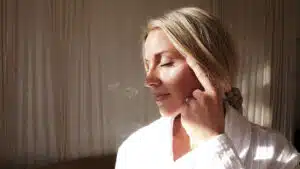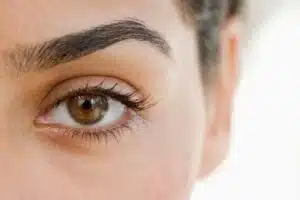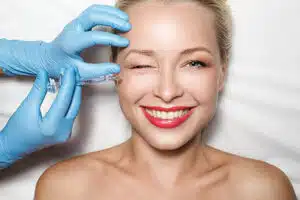May is here, which means Skin Cancer Awareness Month! Skin cancer is the most common form of cancer, with 1 in 7 Canadians developing the cancer in their lifetime. Fortunately, skin cancer is also one of the most preventable cancers.
We interviewed Dr. Mandy Wong, General Practitioner at Dermapure Kelowna who holds a Masters in Medicine in the Field of Skin Cancer and dedicates her practice to skin and vein health. She shares some useful advice to reduce your skin cancer risk, as well as tips to check your body for any signs of skin cancer.
Tell us about your experience with skin health
Through medical school, I developed an interest in skin health/disease and realized that I enjoy working with my hands. I started in the practice of phlebology (disease of the veins) 25 years ago, allowing me to work with my hands, and I continue to enjoy this part of my practice to this day.
As my children became older, I had the luxury of time to devote to further training. I started with a Diploma in Dermatology through the University of Cardiff to help understand general skin disease better. I then completed a Masters in Medicine in the Field of Skin Cancer from the University of Queensland.
Before we dive into the prevention of melanoma, or skin cancer, what are some facts we should know about skin health?
Many people do not realize the importance of sunscreen in their youth. The issue is skin damage and cancer is a cumulation of UV radiation-induced injury to DNA of the skin cells over time. There is only so much DNA damage our bodies can repair before the damage is so far gone that it produces a skin cancer. A tan is your body’s defense mechanism to create an umbrella over the skin cell’s DNA. Unfortunately, a deep tan only gives you an SPF of about 3. Tanning beds are a definite health hazard as they give off roughly 12 times more UVA light than natural sunlight.
What can we do to reduce the risk of skin cancer?
There is no doubt that sun exposure increases blood levels of endorphins, the “feel-good hormones”. Skin health does not mean that you need to give this up!
• Make putting on sunscreen part of your everyday routine, summer and winter.
• Make every effort to educate your children on the importance of protection from UV radiation.
• Try to enjoy the sun early or late in the day, which in the summer is before 10 am or after 4 pm.
• Remember to re-apply your sunscreen every couple of hours, especially if you are in the water.
• Examine your skin head to toe every month and the use of a mirror while standing in front of a mirror will help you examine difficult to see areas such as your back.
• Any new spots should be monitored for at least 2 – 3 months. If they do not resolve on their own or are growing or changing rapidly, you should see your family doctor for further evaluation.
Sunscreen: when, why and how?
A broad-spectrum sunscreen (protects against UVB and UVA) with SPF of at least 30 is recommended. Most skin specialists prefer mineral sunscreens to chemical sunscreens.
Mineral sunscreens with zinc and/or titanium sit on top of your skin and physically reflect the UVR. They work as soon as you apply them and will work so long as you have not washed or wiped them off. Chemical sunscreens absorb the UV radiation but with time their ability to do so declines. They need to be applied 30 minutes prior to going outdoors so they can be absorbed by the skin and reapplied every two hours.
Remember that you are only getting the SPF stated if you apply enough of it. One ounce (about the size of a shot glass) should be used if exposing your entire body, and a nickel sized dollop if only your face is exposed. Sunscreen should be applied directly onto the skin, over other moisturizers or skin care products and underneath makeup. If you are not keen on re-applying sunscreen to your face later in the day over your make-up, consider dry mineral sunscreens that you can apply to our face just like you would apply your face powder for a touch up.
Is there anything important we should be doing that is not common practice?
There are all kinds of SPF protective clothing available. Loose, light colored cotton clothing is great as an alternative to sunscreen on your body. Obviously, a good hat is helpful, just ensure you still have sunscreen on your face to fend off reflected UV rays from water, sand, snow, painted walls, concrete and even grass.
What does a skin analysis at Dermapure Kelowna look like?
Due to the sheer volume of patients with skin cancer in Kelowna, if you have a lesion of concern, we recommend you see your family doctor first. If your doctor is concerned, they will either biopsy the lesion or refer you for further evaluation and treatment. If you are high risk for skin cancer due to the history of many skin cancers or a melanoma, we do offer skin cancer screening with referral from your physician.
If you are not at high risk but would like to have regular screening, we offer yearly skin cancer screening along with digital mole mapping. This service is not covered by MSP and more information can be obtained by calling the office.
If we notice something new on our skin, what do we do?
As we get older, it is expected that we will develop new spots on our skin that are not necessarily cancerous. Common examples are sun spots, red spots, scaly and greasy feeling raised spots that range in color from tan to black. We can also develop spots that will go away in time. Any lesion that persists more than a couple months, is growing or changing should be checked by your family doctor, especially if it bleeds easily. A new pigmented spot that looks different from the rest of the moles on your body may be a sign of melanoma and should be examined.
Any other important facts or information you may know that is relevant for everyone?
Besides causing skin cancer, UV radiation also depletes the collagen in your skin. Enjoy the sun but be smart about it – it will decrease your chances of developing skin cancer and combat wrinkles!
Thank you, Dr. Wong, for sharing your wealth of knowledge about skin cancer and prevention!
We are with you every step of the way on your journey to healthy and beautiful skin!
Our experienced team of consultants and physicians at Dermapure can help you choose the appropriate treatment plan for your skin concerns.
Call us for a free consultation today and rediscover healthy looking skin: 1 877-252-0293






